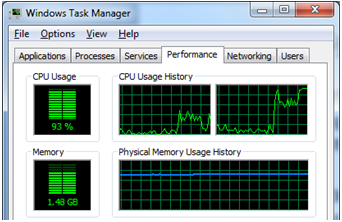root@mowa219-gjp4-zbook-freebsd:~ # pcm-pcie
Intel(r) Performance Counter Monitor: PCIe Bandwidth Monitoring Utility
This utility measures PCIe bandwidth in real-time
PCIe event definitions (each event counts as a transfer):
PCIe read events (PCI devices reading from memory - application writes to disk/network/PCIe device):
PCIePRd - PCIe UC read transfer (partial cache line)
PCIeRdCur* - PCIe read current transfer (full cache line)
On Haswell Server PCIeRdCur counts both full/partial cache lines
RFO* - Demand Data RFO
CRd* - Demand Code Read
DRd - Demand Data Read
PCIeNSWr - PCIe Non-snoop write transfer (partial cache line)
PCIe write events (PCI devices writing to memory - application reads from disk/network/PCIe device):
PCIeWiLF - PCIe Write transfer (non-allocating) (full cache line)
PCIeItoM - PCIe Write transfer (allocating) (full cache line)
PCIeNSWr - PCIe Non-snoop write transfer (partial cache line)
PCIeNSWrF - PCIe Non-snoop write transfer (full cache line)
ItoM - PCIe write full cache line
RFO - PCIe partial Write
CPU MMIO events (CPU reading/writing to PCIe devices):
UCRdF - read from uncacheable memory, including MMIO
WCiL - streaming store (partial cache line), includes MOVDIRI
WCiLF - streaming store (full cache line), includes MOVDIR64
PRd - MMIO Read [Haswell Server only] (Partial Cache Line)
WiL - MMIO Write (Full/Partial)
* - NOTE: Depending on the configuration of your BIOS, this tool may report '0' if the message
has not been selected.
===== Processor information =====
Hybrid processor : no
IBRS and IBPB supported : yes
STIBP supported : yes
Spec arch caps supported : no
Max CPUID level : 13
CPU model number : 60
Number of physical cores: 4
Number of logical cores: 8
Number of online logical cores: 8
Threads (logical cores) per physical core: 2
Num sockets: 1
Physical cores per socket: 4
Last level cache slices per socket: 4
Core PMU (perfmon) version: 3
Number of core PMU generic (programmable) counters: 4
Width of generic (programmable) counters: 48 bits
Number of core PMU fixed counters: 3
Width of fixed counters: 48 bits
Nominal core frequency: 2500000000 Hz
IBRS enabled in the kernel : yes
STIBP enabled in the kernel : yes
Package thermal spec power: 47 Watt; Package minimum power: 0 Watt; Package maximum power: 0 Watt;
Socket 0: 0 PCU units detected. 0 IIO units detected. 0 IRP units detected. 0 CHA/CBO units detected. 0 MDF units detected. 0 UBOX units detected. 0 CXL units detected. 0 PCIE_GEN5x16 units detected. 0 PCIE_GEN5x8 units detected.
For non-CSV mode delay < 1.0s does not make a lot of practical sense. Default delay 1s is used. Consider to use CSV mode for lower delay values
Update every 1 seconds
Detected Intel(R) Core(TM) i7-4710MQ CPU @ 2.50GHz "Intel(r) microarchitecture codename Haswell" stepping 3 microcode level 0x28
Jaketown, Ivytown, Haswell, Broadwell-DE, Skylake, Icelake, Snowridge and Sapphirerapids Server CPU is required for this tool! Program aborted
Cleaning up
Zeroed PMU registers
Zeroed uncore PMU registers
root@mowa219-gjp4-zbook-freebsd:~ #




